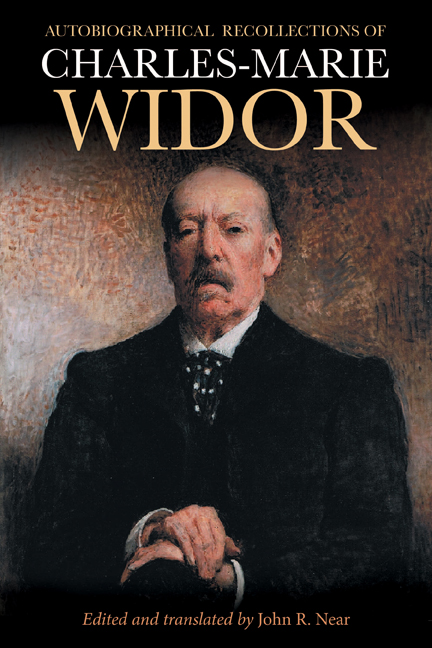Book contents
- Frontmatter
- Contents
- List of Illustrations
- Foreword
- Preface
- Acknowledgments
- Introduction: Tribute to Charles-Marie Widor
- Part One Studies, Early Performances, and Aristide Cavaillé-Coll (1844–69)
- Part Two La Belle Époque: The Franco-Prussian War to The Great War (1870–1914)
- Part Three The Great War and Important Initiatives (1914–37)
- Appendix 1 Birth record of Charles-Marie Widor, 1844
- Appendix 2 Widor’s Diplôme de Bachelier ès Lettres, 1863
- Appendix 3 Widor’s letter of appreciation to Jacques Lemmens, 1863
- Appendix 4 Brussels Ducal Palace organ specification, 1861
- Appendix 5 Widor’s certificate for Chevalier de l’Ordre du Christ, 1866
- Appendix 6 “To Budapest,” 1893
- Appendix 7 Widor’s travels to Russia and his 1903 passport
- Appendix 8 Widor’s list of his works in 1894
- Appendix 9 The Paris Conservatory organs, 1872
- Appendix 10 Chronique [Widor’s appeal for an organ hall at the Paris Conservatory, 1895]
- Appendix 11 Widor’s certificate for the Académie Royale, Brussels, 1908
- Appendix 12 “Debussy & Rodin,” 1927
- Appendix 13 The American Conservatory organ, Fontainebleau, 1925
- Appendix 14 Letters concerning the Trocadéro organ restoration, 1926
- Notes
- Bibliography
- Index
- Eastman Studies in Music
17 - 1880: La Korrigane, ballet fantastique in two acts
Published online by Cambridge University Press: 09 May 2024
- Frontmatter
- Contents
- List of Illustrations
- Foreword
- Preface
- Acknowledgments
- Introduction: Tribute to Charles-Marie Widor
- Part One Studies, Early Performances, and Aristide Cavaillé-Coll (1844–69)
- Part Two La Belle Époque: The Franco-Prussian War to The Great War (1870–1914)
- Part Three The Great War and Important Initiatives (1914–37)
- Appendix 1 Birth record of Charles-Marie Widor, 1844
- Appendix 2 Widor’s Diplôme de Bachelier ès Lettres, 1863
- Appendix 3 Widor’s letter of appreciation to Jacques Lemmens, 1863
- Appendix 4 Brussels Ducal Palace organ specification, 1861
- Appendix 5 Widor’s certificate for Chevalier de l’Ordre du Christ, 1866
- Appendix 6 “To Budapest,” 1893
- Appendix 7 Widor’s travels to Russia and his 1903 passport
- Appendix 8 Widor’s list of his works in 1894
- Appendix 9 The Paris Conservatory organs, 1872
- Appendix 10 Chronique [Widor’s appeal for an organ hall at the Paris Conservatory, 1895]
- Appendix 11 Widor’s certificate for the Académie Royale, Brussels, 1908
- Appendix 12 “Debussy & Rodin,” 1927
- Appendix 13 The American Conservatory organ, Fontainebleau, 1925
- Appendix 14 Letters concerning the Trocadéro organ restoration, 1926
- Notes
- Bibliography
- Index
- Eastman Studies in Music
Summary
Having learned of my success, Agénor Bardoux very kindly wanted to please me, and in turn offered me either the red ribbon or the commission of a ballet at the Opéra. I naturally chose the ballet. Auguste Vaucorbeil contacted François Coppée who proposed an initial subject. But it did not seem to fit the customs of the Opéra, so a few days later he gave us the scenario of La Korrigane [op. 45, 1880].
I was lucky to have as my main interpreter a young Milanese student from the School of Milan: Mlle Rosita Mauri, who was precisely the ideal character for Coppée's ballet. She was full of talent, vigor, elegance, and spirit, all at the same time. It was a long time ago when the Opéra had seventy subscribers for three days, which gave them the right to go backstage at intermissions.
At that time, the future Edward VII, Prince of Wales, was spending the autumn in Paris and came to the Opéra every evening. I still see myself chatting daily (every evening cordially) with the future majesty on the stage of the Opéra during our rehearsals. He was highly intelligent and interested in everything. Before leaving Paris, he asked me if I would agree to come and play the organ at the Albert Hall on the occasion of an event he was organizing for the benefit of his London hospital. I accepted, and it was in memory of my trip to London that he gave me the interesting portrait of Handel that currently adorns the mirror above the fireplace in the small organ salon [salon de l’orgue] of Saint-Sulpice.
On December 1, 1880, the premiere of La Korrigane took place at the Paris Opéra. The rehearsals had been charming, without any hitches, accidents, or incidents. The premier dancer, Mlle Rosita Mauri, by her spirit, good grace, and talent had conquered all hearts. The Comtesse d’Haussonville [Louise de Broglie], mother of Comte Gabriel-Paul d’Haussonville, having heard some gossip of what was happening at the Opéra (of which she was a subscriber) said to me: “She's charming, but above all don't marry her!”
The premiere was very well received. An unexpectedly select audience included both Léon Gambetta and the Prince of Wales.
- Type
- Chapter
- Information
- Autobiographical Recollections of Charles-Marie Widor , pp. 37 - 38Publisher: Boydell & BrewerPrint publication year: 2024



